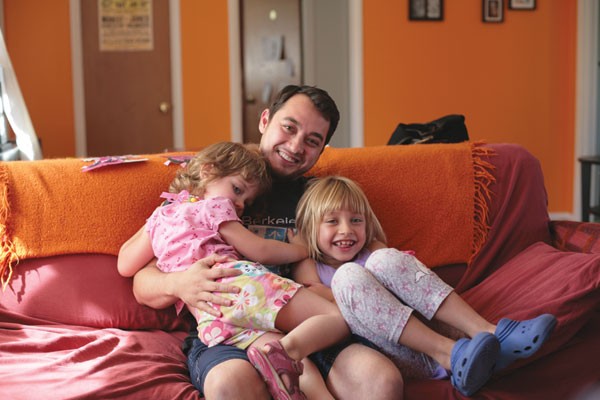Ann Romney’s speech at the 2012 Republican Convention might have been aimed at the hearts of women, but more than a few men were shocked to hear that they didn’t care for their children quite as hard or as lovingly. “If you listen carefully, you’ll hear the women sighing a little bit more than the men,” Romney told the crowd. “It’s how it is, isn’t it? It’s the moms who have always had to work a little harder to make everything right.”
But some say the sighs are just as loud on either side of the gender line.
Mark Greene, a stay-at-home dad and blogger, asked in a post on the Good Man Project, “What century does Ann Romney live in? Two million dads are full-time parents too, and we know it can be an ass-whipping.” Greene has a point. According to reports, the average mother still performs five times as many childcare duties than the average father, but it’s also true that stay-at-home dads are on the rise.
Jeremy Adam Smith, author of The Daddy Shift, calls these men “pioneers who are quietly mapping new territory for all fathers.” In 2011, an estimated 176,000 dads chose to stay home full-time, according to the United States Census, up from 159,000 in 2007, and this isn’t counting those who work part-time from home and take care of the children.
Families in which parents can shift roles actually become more resilient, says Smith. If both parents are capable of working for pay and staying at home to focus on the domestic side of life, they have the flexibility to deal with injuries and job loss. “For our grandfather’s generation, they thought that was off the table,” says Smith, by phone from San Francisco. “His role as the father was breadwinner; no other role was possible. Now if a man finds himself out of work for whatever reason, it’s generally accepted that a good father will step it up at home if the mother is working. We don’t appreciate what a colossal shift that is.”
Scott Morris, 36, of Santa Rosa, has been a stay-at-home dad since the birth of his first daughter seven years ago. At the time, his wife already had a successful career as a senior city planner, and Morris was finishing up school.
“It was a natural progression,” says Morris, “just the way things worked out for us.” Taking on the majority of the domestic duties in the household—mainly childcare and cleaning—came naturally, since his own father was a stay-at-home dad, says Morris.
Though the experience of fathering has brought a mix of exhaustion, isolation and joy, Morris says, “At this point, I can’t think of doing anything that would be more rewarding than being with the kids.”
[page]
Statistics back up the idea that Morris’ embrace of full-time dad status has gained headway. Studies like one by the Boston College Center for Work and Family show that more fathers are staying home by choice, countering the assumption that they do so because they’re unemployed.
A stay-at-home dad to his 15-month-old son, Bryan Clark, 39, works part-time from home and does the childcare in addition to cooking and cleaning.
“My wife has a good-paying job as a full-time behavioral specialist, so it made sense for her to retain her work,” says Clark. He and his wife have come to a place of equality in the raising of their son, explains the Santa Rosa resident. They both take him to doctor’s appointments, and his wife’s schedule allows her the flexibility to come home and nurse. But Clark admits that he sometimes struggles with the fact that he’s not contributing more financially.
“My dad was the kind of guy who brought the money in,” he says. “It’s definitely not what I’m used to. All my guy friends don’t do what I do; they’re all the main ones making the money.”
It’s an issue acknowledged by Jeremy Adam Smith, who affirms that we haven’t stumbled upon utopia when it comes to male caregiving, but that the situation is better than what we had before.
In focusing on new studies, rather than Romney’s “woman as martyr” narrative, there looks to be a nation of parents moving toward a more equitable model. Today’s complicated financial realities demand an ability to think creatively about what it means to parent. It’s a world where fathers often know just as well the fastest route to the emergency room, and where both parents can fathom the feeling of a “love so deep” for their children.










